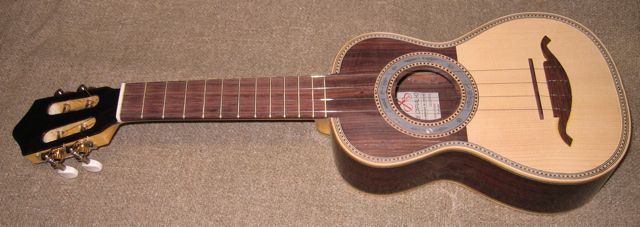DWitt
Well-known member
So, I'm giving a couple of talks in Lisbon, Portugal, in about three weeks. In related news, yeah, my job is pretty nice.
Anyway, I'm thinking about picking up a cavaquinho or braguinha while I'm there. I haven't looked around too carefully, but this place is right around the corner from my hotel, and seems to have a pretty good selection: http://www.salaomusical.com/en/ukuleles-cp159
I have a bunch of questions, and would love to hear anyone's thoughts, experiences, or advice!
Anyone played one of these? Tuned as a uke, or with the banjo tuning? Will they work with ukulele strings, or are the steel strings needed to get good sound out of them? The brands I'm seeing are APC and Artimúsica—anyone know anything about these manufacturers? Should I stick with Salão Musical, or does someone else know someplace else or someplace better to go in Lisboa?
Incidentally, if anyone else is interested, there's a seller on eBay with some, including this good looking, cheap braguinha and this more expensive but stunning cavaquinho.
Anyway, I'm thinking about picking up a cavaquinho or braguinha while I'm there. I haven't looked around too carefully, but this place is right around the corner from my hotel, and seems to have a pretty good selection: http://www.salaomusical.com/en/ukuleles-cp159
I have a bunch of questions, and would love to hear anyone's thoughts, experiences, or advice!
Anyone played one of these? Tuned as a uke, or with the banjo tuning? Will they work with ukulele strings, or are the steel strings needed to get good sound out of them? The brands I'm seeing are APC and Artimúsica—anyone know anything about these manufacturers? Should I stick with Salão Musical, or does someone else know someplace else or someplace better to go in Lisboa?
Incidentally, if anyone else is interested, there's a seller on eBay with some, including this good looking, cheap braguinha and this more expensive but stunning cavaquinho.

